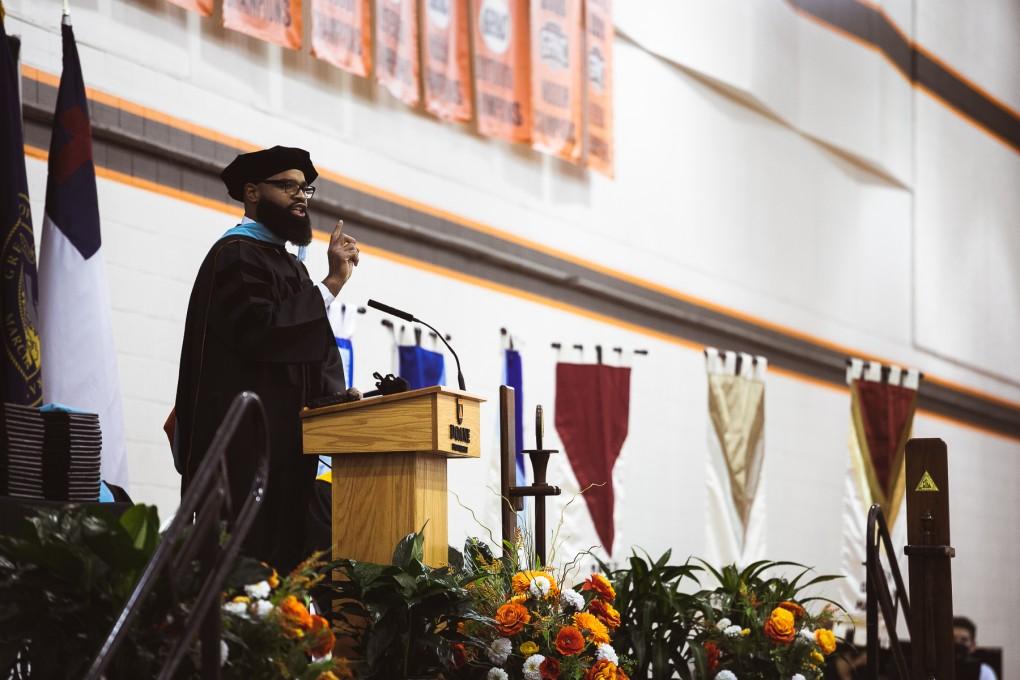
Heads nodded in agreement throughout Dr. Jamar Dorsey’s commencement address to Doane University graduates on Saturday, Dec. 11. Dorsey’s address, “Becoming Activated,” was a call to the 150 newly minted alumni in the audience to recognize their incredible accomplishments and how to take the tools they now have to build their futures.
“Now, you’re at a destination. But this destination is also the starting point for something else,” Dorsey ’20ED, said. “If you can get through everything you’ve been through to get to this point today, imagine what you can do now.”
For Dorsey, a former teacher, non-profit education consultant, mentor and advocate, lifting up others and helping them find opportunities and build bridges was always a given. That drive has influenced him throughout his life and career, in his volunteer work with the City of Omaha Human Rights and Relations board, the Great Plains Black History Museum board, the Concord Mediation Center, the Iowa Western Community College football team, as a husband and parent, as a member of the Alpha Phi Alpha fraternity.
And after hearing him speak, you know this is definitely not the only time he’ll stand on stage and inspire those around him.
“I’m very blessed that I have eight to 10 minutes to hopefully just ignite them, just a little bit on what next steps should look like, no matter what situation they’re in right now,” Dorsey said.
It’s truly remarkable that graduates have reached this milestone, he said, especially after two years of living, working and caring for family, during a pandemic.
The message is also drawn from Dorsey’s own experiences. He graduated just a year and a half earlier from Doane with his own doctorate, in the middle of so much uncertainty caused by COVID-19 and into a period of reckoning for the many racial and social inequities in the United States.
He likened that graduation experience to a travel destination, an all-inclusive resort.
“One thing about one of those great travel destination points, right? You go there and you relax and you recharge, you refresh and you celebrate,” he said. “But then after that, you go back to where you were when you left. And that’s where we can start digging in and doing the real work.”
Which is exactly what he did after he completed his dissertation, a qualitative look at the experiences of African American male teachers and why they decided to stay in the classroom. Particularly when they may be the only African American teacher, let alone male, in a classroom or educational setting.
In fact, for the 2020-21 school year, the Nebraska Department of Education reported that fewer than 1% of teachers in Nebraska were Black and did not offer a breakdown by gender.
“Lifting up and hearing those stories and voices resonated with me and made me reflect a lot about my educational journey,” Dorsey said, of his own education at Omaha’s Central High School and Grambling State University, and his experience as a teacher and coach.
And in that reflection, he saw an opportunity to help others grow, to change perspectives and to build relationships. Like many others during the pandemic, he decided to take his career into his own hands.
“It allowed me to find what my sweet spot was, I think, in the greater community,” he said.
Dorsey is now a consultant, providing insights on how to make communities and workplaces more inclusive, how to recruit and retain African American talent, how to build leadership and relationships, and more. He works with individuals to provide one-on-one coaching, with groups and teams, departments, during workshops and professional development seminars, all the way up to corporate C-suites.
He has more than a solid start already, from years of building relationships with professionals throughout and beyond the Omaha community. For example, Dorsey has had a relationship with Doane’s education programs for a decade, having participated in and been invited to speak at summer intensives for teachers earning their master’s degrees. Those were actually his introduction to the university, and what eventually led him to complete his doctorate at Doane.
“As I started speaking there and building relationships and started to dig in, I was like, ‘okay, this is a unique format for post-secondary and graduate work,’” Dorsey said. “You know, when you’ve got a full-time job, and you’re a full-time family member with full-time kids, they [Doane] found a way to make it all very doable. We don’t have to give up some of those things that oftentimes, for many colleges and universities, you have to give up to be able to pursue your educational journeys.”
Throughout that decade, Dorsey also became the director of high school programs, and later, the director of community engagement at Avenue Scholars Foundation, which connects high school students with career opportunities, planning, support and mentorship. Many of the teachers and administrators Dorsey met at Doane’s education intensives have also become his colleagues at the non-profit or become mentors to students through the program.
His work at Avenue Scholars also led him to connect with Dr. Kenneth Bird, President and CEO of the non-profit. He approached Bird about becoming an independent consultant, and was immediately supported.
“He [Bird] said Avenue Scholars will support you, we want you to still be here, and do some really great work for us,” Dorsey said. “And so I’m in a fortunate situation where I’m able to still support Avenue Scholars and do some work in diversity, equity and inclusion.”
He’ll continue working with the non-profit as an independent education consultant. There is some uncertainty with leaving an established business, but at the same time, his decision wasn’t made in isolation.
“It’s a lot of family support, too,” he said. “I’ve got an awesome wife, family, kids and just so much really good support that allows me the opportunity to be flexible at this stage in my life.”

